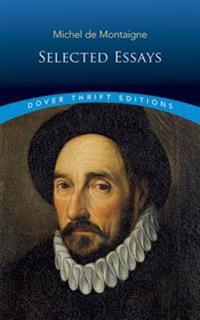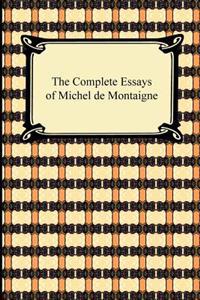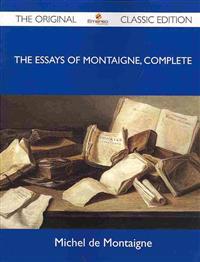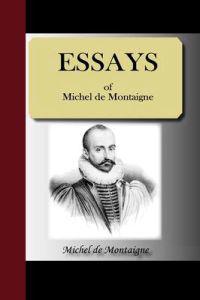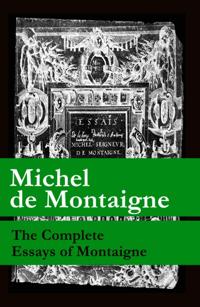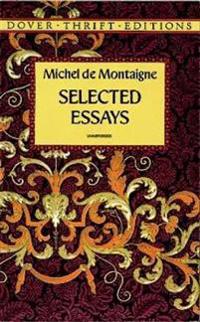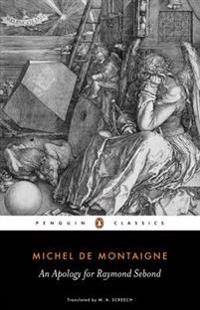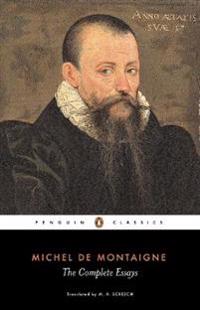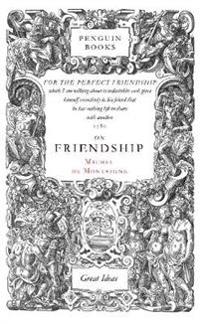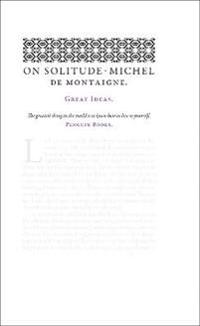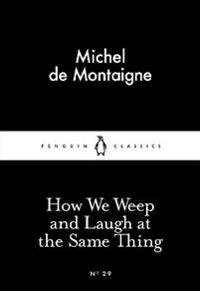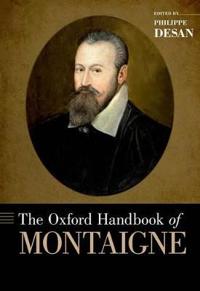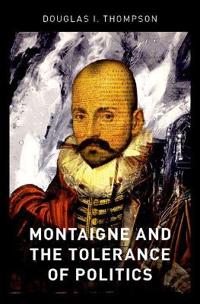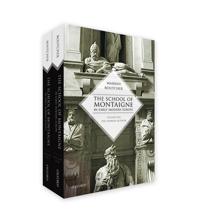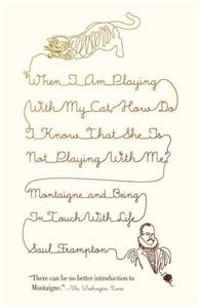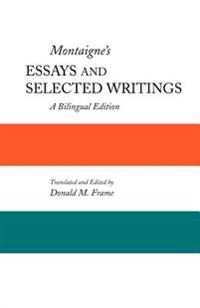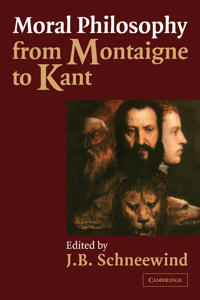Michel de Montaigne (Pocket)
avMichel De Montaigne, Charles Cotton, William Carew Hazlitt
ISBN: 9780486486031 - UTGIVEN: 201201One of France's great Renaissance thinkers, Montaigne was remarkably modern in his views. These highly readable essays reflect his thoughts on poetry, philosophy, theology, law, literature, education, and world exploration. Filled with aphorisms and anecdotes, enlivened by wordplay and a delightful [...]
The Complete Essays of Michel de Montaigne (Häftad)
avMichel de Montaigne
ISBN: 9781420934205 - UTGIVEN: 2009-01The Essays of Montaigne, Complete - The Original Classic Edition (Häftad)
avMichel de Montaigne
ISBN: 9781486144259 - UTGIVEN: 201206Essays of Michel de Montaigne (Inbunden)
avMichel de Montaigne
ISBN: 9781595475138 - UTGIVEN: 2009-06Complete Essays of Montaigne (107 annotated essays in 1 eBook + The Life of Montaigne + The Letters of Montaigne)
ISBN: 9788074849787 - UTGIVEN: 2015-06This carefully crafted ebook: "e;The Complete Essays of Montaigne (107 annotated essays in 1 eBook + The Life of Montaigne + The Letters of Montaigne)"e; is formatted for your eReader with a functional and detailed table of contents.Table of Contents:Preface.; The Life of Montaigne; The Lett[...]
Selected Essays (Häftad)
avMichel de Montaigne, Montaigne
ISBN: 9780486291093 - UTGIVEN: 2013068 masterly essays by great French thinker: "Of Friendship," "Of Books," "Of Cruelty," "Of Repentance," four more. Classic Charles Cotton translation.
[...]Montaigne in Barn Boots: An Amateur Ambles Through Philosophy (häftad)
ISBN: 9780062230577 - UTGIVEN: 2018-10The beloved memoirist and bestselling author of Population: 485 reflects on the lessons he's learned from his unlikely alter ego, French Renaissance philosopher Michel de Montaigne."The journey began on a gurney," writes Michael Perry, describing the debilitating kidney stone that led him to discove[...]
Essays (Pocket)
avMichel De Montaigne
ISBN: 9780140178975 - UTGIVEN: 1993-03-25Revealing the author's thoughts on sexuality, religion, cannibals, intellectuals, and other unexpected themes, this work includes titles such as: "On Solitude," "To Philosophize Is to Learn How to Die," and "On Experience".[...]
An Apology for Raymond Sebond (Pocket)
avMichel De Montaigne
ISBN: 9780140444933 - UTGIVEN: 1988-01"An Apology for Raymond Sebond" is widely regarded as the greatest of Montaigne's essays: a supremely eloquent expression of Christian scepticism. An empassioned defence of Sebond's fifteenth-century treatise on natural theology, it was inspired by the deep crisis of personal melancholy that followe[...]
The Essays (Pocket)
avMichel De Montaigne
ISBN: 9780140446029 - UTGIVEN: 1993-08-26To overcome a crisis of melancholy after the death of his father, Montaigne withdrew to his country estates and began to write. This title discusses Montaigne's themes such as fathers and children, conscience and cowardice, and coaches and cannibals.[...]
The Complete Essays (Storpocket)
avMichel de Montaigne
ISBN: 9780140446043 - UTGIVEN: 199302In 1572, Montaigne retired to his estates in order to devote himself to leisure, reading and reflection. There he wrote his constantly expanding 'essays', inspired by the ideas he found in books from his library and his own experience. He discusses subjects as diverse as war-horses and cannibals, po[...]
On Friendship (Pocket)
avMichel de Montaigne
ISBN: 9780141018867 - UTGIVEN: 200409Throughout history, some books have changed the world. They have transformed the way we see ourselves - and each other. They have inspired debate, dissent, war and revolution. They have enlightened, outraged, provoked and comforted. They have enriched lives - and destroyed them. Now Penguin brings y[...]
On Solitude (Häftad)
avMichel de Montaigne
ISBN: 9780141043852 - UTGIVEN: 200908Blending intellectual speculation with anecdote and personal reflection, the Renaissance thinker and writer Montaigne pioneered the modern essay. This selection contains his idiosyncratic and timeless writings on subjects as varied as the virtues of solitude, the power of the imagination, the pleasu[...]
How We Weep and Laugh at the Same Thing (Häftad)
avMichel Eyquem de Montaigne
ISBN: 9780141397221 - UTGIVEN: 2015-02'No one characteristic clasps us purely and universally in its embrace.' A selection of charming essays from a master of the genre exploring the contradictions inherent to human thought, words and actions. Introducing Little Black Classics: 80 books for Penguin's 80th birthday. Little Black Classics[...]
The Oxford Handbook of Montaigne
ISBN: 9780190215330 - UTGIVEN: 2016-10In 1580, Michel de Montaigne (1533-1592) published a book unique by its title and its content: Essays"R. A literary genre was born. At first sight, the Essays resemble a patchwork of personal reflections, but they engage with questions that animate the human mind, and tend toward a single goal: to l[...]
Montaigne and the Tolerance of Politics
ISBN: 9780190679934 - UTGIVEN: 2018-01Montaigne and the Tolerance of Politics argues for toleration as a practice of negotiation, looking to a philosopher not usually considered political: Michel de Montaigne. Douglas I. Thompson draws on Montaigne's Essais to recover the idea that political negotiation grows out of genuine care for pub[...]
The School of Montaigne in Early Modern Europe (övrigt)
ISBN: 9780198739678 - UTGIVEN: 2017-03This major two-volume study offers an interdisciplinary analysis of Montaigne's Essais and their fortunes in early modern Europe and the modern western university. Volume one focuses on contexts from within Montaigne's own milieu, and on the ways in which his book made him a patron-author or instant[...]
Montaigne's English Journey: Reading the Essays in Shakespeare's Day (Inbunden)
avWilliam M. Hamlin
ISBN: 9780199684113 - UTGIVEN: 2013-11-14Fabulous Imagination, The: On Montaigne's Essays (Övrig)
avLawrence D. Kritzman
ISBN: 9780231119924 - UTGIVEN: 2009-06-05"This is one of the few books on Montaigne that fuses analytical skill with humane awareness of why Montaigne matters."--Harold Bloom, Sterling Professor of Humanities, Yale University "In this exhilarating and learned book on Montaigne's essays, Lawrence D. Kritzman contemporizes the great writer[...]
Fabulous Imagination, The: On Montaigne's Essays (Övrig)
avLawrence D. Kritzman
ISBN: 9780231119931 - UTGIVEN: 2012-02-03"This is one of the few books on Montaigne that fuses analytical skill with humane awareness of why Montaigne matters."--Harold Bloom, Sterling Professor of Humanities, Yale University "In this exhilarating and learned book on Montaigne's essays, Lawrence D. Kritzman contemporizes the great writer[...]
When I Am Playing with My Cat, How Do I Know That She Is Not Playing with Me?: Montaigne and Being in Touch with Life (Häftad)
avSaul Frampton
ISBN: 9780307278654 - UTGIVEN: 201204A celebration of Montaigne, the most enjoyable and yet profound of all Renaissance writers.
In the year 1570, at the age of thirty-seven, Michel de Montaigne gave up his job as a magistrate and retired to his chateau to brood on the deaths of his best friend, his father, his brother, and his fir[...]Montaigne's Essays and Selected Writings: A Bilingual Edition (Häftad)
ISBN: 9780312546359 - UTGIVEN: 1969-10These classic translations of Montaigne are presented with the authoritative French text on facing pages and provide an introduction and extensive notes helping students appreciate the depth and clarity of Montaigne's thinking. The text includes Books 1, 2, and 3 of the essays; Montaigne's translati[...]
Montaigne (Övrig)
avHugo Friedrich
ISBN: 9780520072534 - UTGIVEN: 1991-07-16Friedrich considers the "Montaigne of the Essays" on of the first 'moralists' in the French sense of the term, recording with anthropological fervor and in fresh, informal language the full spectrum of human thought and commerce as he saw it. Philippe Desan, who introduces this fine translation, com[...]
Moral Philosophy from Montaigne to Kant (Pocket)
avJ. B. (EDT) Schneewind
ISBN: 9780521003049 - UTGIVEN: 2003-01This anthology contains excerpts from some thirty-two important seventeenth- and eighteenth-century moral philosophers. Including a substantial introduction and extensive bibliographies, the anthology facilitates the study and teaching of early modern moral philosophy in its crucial formative period[...]
Michel De Montaigne (Pocket)
avAnn Hartle
ISBN: 9780521037815 - UTGIVEN: 2007-07Michel de Montaigne, the inventor of the essay, has always been acknowledged as a great literary figure but has never been thought of as a philosophical original. This book treats Montaigne as a serious thinker in his own right, taking as its point of departure Montaigne's description of himself as [...]

